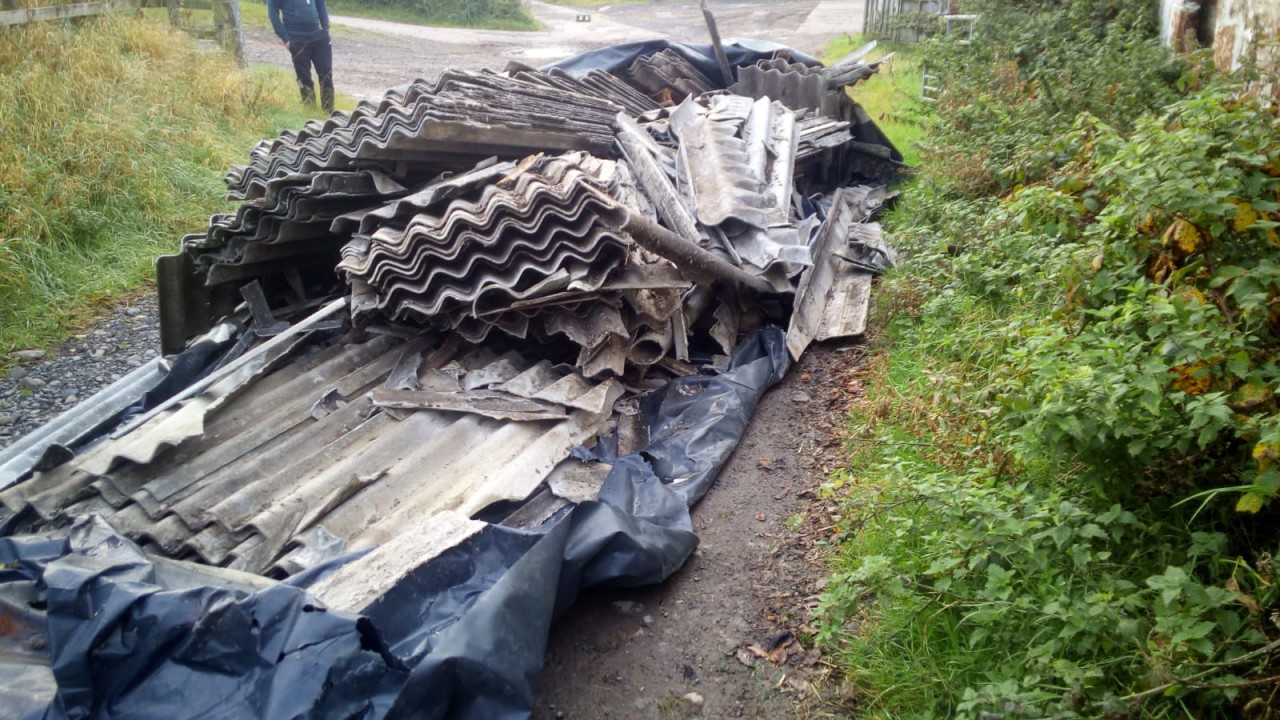A lorry-load of asbestos sheets dumped on a farm near Annan has shown the major flaws that exist in Scotland’s fly-tipping regulations and left the farmer facing a four-figure bill to have the extremely hazardous material cleared.
The load of asbestos was dumped at Broats Farm Steading, run by John Jamieson in the early hours of Friday (October 16).
The volume of dumped asbestos immediately restricted access to farm sheds, straw and fodder.
Due to the hazardous nature of the material, the incident was raised as a matter of urgency with local and national agencies – Dumfries and Galloway Council, Police Scotland, SEPA and Zero Waste Scotland.
Limited support has been offered, a site visit has been undertaken by the local authority, but it appears that John Jamieson will be held responsible for the uplift and disposal of the waste.
Without any identifiable content in the asbestos waste, it is unlikely that any agency intends to pursue the case for investigation and prosecution.
Pending a crime reference number being allocated, Jamieson will investigate whether his farm insurance policy will cover the cost of uplift and removal.
Due to the hazardous nature of the waste, a special licence is required adding to the cost. John Jamieson’s situation is made more difficult by the fact that if he does not dispose of the dumped asbestos correctly, he may be open to prosecution.
NFU Scotland’s regional manager for Dumfries and Galloway, Teresa Dougall, who has been assisting Jamieson with the case, said:
“It’s a hugely frustrating story as almost every person that John Jamieson and NFU Scotland turned to about this dreadful incident shifted the responsibility to someone else.
Although not wholly surprising, we had hoped, due to the extremely hazardous nature of asbestos, that someone would raise their head above the parapet.
“Not only does this highlight the lack of general support – both physical and legislative – in tackling the surge in fly-tipping across Scotland but when hazardous waste is involved, that support still isn’t available and the innocent landowner is left to carry the cost of clean-up and disposal.”
‘The blight of fly-tipping’
According to NFU Scotland, the Scottish government and local authorities have failed to address the blight of fly-tipping in the countryside.
Covid-19 restrictions on local authority recycling centres earlier in the year saw a severe spike in fly-tipping incidents across Scotland and, despite recycling centres re-opening, fly-tipping incidents are still being recorded daily by NFU Scotland members.
Cases have included rotting meat, domestic appliances, household waste, builder’s rubble, garden cuttings, pallets, and garage waste including tyres and car batteries.
To address this, NFU Scotland is calling for:
- A national fly-tipping strategy to be delivered by the Scottish government as a matter of urgency;
- Local authorities to provide financial assistance to help land managers clean up and prevent disposal of fly-tipped waste;
- Where fly-tipping is of a hazardous nature, greater and urgent delivery of support must be given to landowners, including financial grants to access professional waste removal services;
- Greater householder responsibility to ensure their waste is disposed of legally and more punitive action directed to those who use illegal waste carriers;
- Greater resources to be made available to Police Scotland, other investigative bodies such as SEPA, and local authorities to pursue fly-tippers;
- The creation of a national database of fly-tipping, requiring compulsory, monthly reporting on fly-tipping from local authorities and figures to include information about fly-tipping events on private lands.

